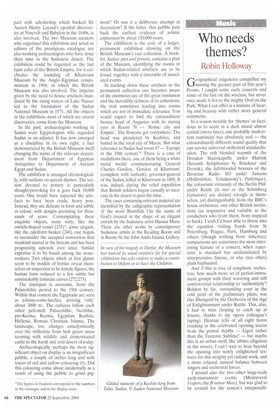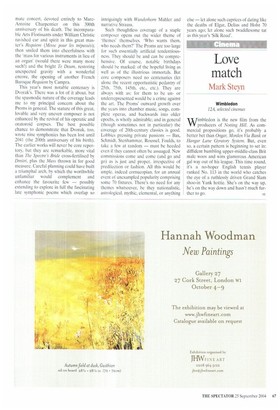Who needs themes?
Robin Holloway
Geographical exigencies compelled my missing the greater part of this year's Proms: I caught some early concerts and some of the last on the wireless, but never once made it live to the mighty Oval on the Park. What I can offer is a mixture of hearing and hearsay with rather more general comments.
In a season notable for 'themes' so factitious as to seem in a dark mood almost cynical (more later), one probably inadvertent continuity was absolutely real — the extraordinarily different sound quality that can survive universal orchestral standardisation. The soft blended warmth of the Dresden Staatskapelle under Haitink (Seventh Symphonies by Bruckner and Dvorak), the full-blooded bravura of the Bavarian Radio SO under Jansons (Heldenleben: Tchaikovsky's Pathetique), the colouristic virtuosity of the Berlin Phil. under Rattle (la mer or the Schonberg Variations) are distinct enough in themselves, yet distinguishable from the BBC's house orchestras, and other British institutions (as responsive and variable as the conductors who front them, from inspired to hack). I wish I'd been able to throw into the equation visiting bands from St Petersburg, Prague, Paris, Hamburg and others (though nothing from America): comparisons are sometimes the most interesting feature of a concert, when repertoire is standard but unilluminated by interpretative finesse, or else (too often) plain haphazard.
And if this is true of symphony orchestras, how much more so of period-instrument groups with their wavering and still controversial relationship to 'authenticity'! Boldest by far, outstanding even in the cold print of the preliminary plans, was Das Rheingold by the Orchestra of the Age of Enlightenment under Rattle. This, alas, I had to miss (hoping to catch up at leisure, thanks to my opera colleague's taping). Hearsay tells of all eight horns cracking in the celebrated opening ascent from the primal depths — Ligeti rather than the Teutonic Sublime! — but maybe this is an urban myth like albino alligators in the sewers. I can't wait to hear beyond the opening into newly enlightened textures for this weighty yet radiant work, and a more relaxed, natural balance between singers and orchestral forces.
I missed also the two other large-scale early-instrument events (Monteverdi Vespers; the B minor Mass), but was glad to be around for the season's antepenulti mate concert, devoted entirely to MarcAntoine Charpentier on this 300th anniversary of his death. The incomparable Arts Florissants under William Christie ravished ear and spirit in this great master's Requiem (Messe pour les trepasses); then smiled them into cheerfulness with the 'mass for various instruments in lieu of an organ' (would there were many more such!) and the bright Te Deum, restoring unexpected gravity with a wonderful encore, the opening of another French Baroque Requiem by Campra.
This year's most notable centenary is Dvorak's. There was a lot of it about, but the spasmodic nature of the coverage leads me to my principal concern about the Proms in general. The stature of this great, lovable and very uneven composer is not enhanced by the revival of his operatic and oratoroid corpses. The best possible chance to demonstrate that Dvorak, too, wrote nine symphonies has been lost until 2041 (the 200th anniversary of his birth). The earlier works will never be core repertory, but they are remarkable, more vital than The Spectre's Bride cross-fertilised by Dmitri, plus the Mass thrown in for good measure. Careful planning could have built a triumphal arch, by which the worthwhile unfamiliar would complement and enhance the favourite few — possibly extending to explore in full the fascinating late symphonic poems which overlap so intriguingly with Wunderhorn Mahler and narrative Strauss.
Such thoughtless coverage of a staple composer opens out the wider theme of 'themes' themselves. 'Who wants them, who needs them?' The Proms are too large for such essentially artificial tendentiousness. They should be and can be comprehensive. Of course, notable birthdays should be marked: of the hopeful living as well as of the illustrious immortals. But core composers need no centenaries (let alone the recent opportunistic pedantry of 25th, 75th, 145th, etc., etc.). They are always with us: for them to be unor underrepresented would be a crime against the art. The Proms' outward growth over the years into chamber music, songs, complete operas, and backwards into older epochs. is wholly admirable; and in general (though sometimes not in particular) the coverage of 20th-century classics is good. Lobbies pressing private passions — Box, Schmidt, Stenhammar, Roussel. Foulds, to take a few at random — must be heeded even if they cannot often be assuaged. New commissions come and come (and go and go) as is just and proper, irrespective of predilection or fashion. All this would be ample. indeed cornucopian, for an annual event of unexampled popularity comprising some 70 fixtures. There's no need for any themes whatsoever, be they nationalistic, astrological, mythic, elemental, or anything else — let alone such caprices of dating like the deaths of Elgar, Delius and Hoist 70 years ago; let alone such twaddlesorne tat as this year's 'Silk Road'.



























































































 Previous page
Previous page